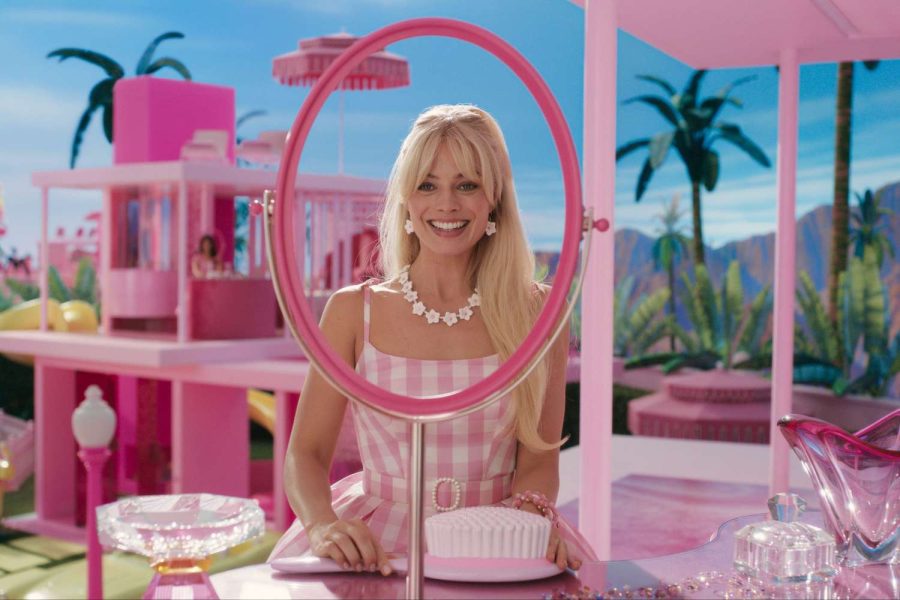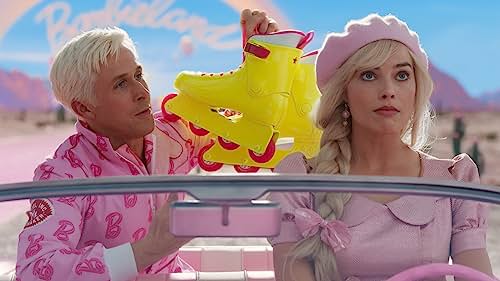
Barbie review: Greta Gerwig’s bittersweet ride through nostalgia, feminism, and frivolity

“She is everything, he is just Ken,” is a line we’ve become vastly familiar with ever since Barbie’s second trailer was released, and the tagline became a viral meme. Greta Gerwig’s Barbie, starring Margot Robbie as Barbie and Ryan Gosling as Ken, faces a problem rooted in the ideology of attempting to be everything, which ultimately prevents it from excelling at anything.
The film grapples with two conflicting aspects: an intellectual introspection of how Barbie has presented unrealistic beauty standards and unhealthy ideas of womanhood to young girls, and a silly, frothy corporate commercial that capitalizes on nostalgia and serves it to you on a hot-pink platter.
The dilemma of tone
This one-hour-54 minute-long feature appears lost in its dilemma of which tone to pursue. This confusion arises when a filmmaker known for her feminist and nuanced storytelling is compelled to serve a brand, resulting in a film that is neither entirely fun, nor intellectually or emotionally stimulating.
There are two ways in which the film could’ve proceeded — first, a full-blown celebration of the politically incorrect doll of our childhood that indulges the audience with candyfloss aesthetic and tiny nostalgic details (it does in some parts, but hesitantly), and second a deeply layered critique of what Barbie stood for, while revamping the archaic idea to dive into a contemporary discourse of gender, identity, existentialism, desire and more. However, Gerwig is reluctant to be unabashedly superficial, and Mattel makes sure that the cerebral discourse is guarded, if not, censored.
Also read: Oppenheimer review: Breathtaking visuals, enigmatic Murphy make for a flawed yet thrilling fare
It all begins, when Stereotypical Barbie (Robbie) living in the decadently perfect Barbie Land, which is swarming with various kinds of Barbies, all pinned down to one attribute (President Barbie, Journalist Barbie, Physicist Barbie, your quintessential blonde-haired, blue-eyed Stereotypical Barbie, amongst others) is hit by an existential crisis, symbolized by flat feet, thoughts about death, cellulite and bad breath in the morning.
The Real World’s dark realities
It comes to her knowledge that the human, who is playing with her in the Real World, is preoccupied with rather sad and morbid thoughts, causing osmotic transfers of these feelings and issues. As advised by Weird Barbie, Stereotypical Barbie must go to the Real World and snap this human out of her grief. Barbie must help her to help herself, so she, along with Ken, who follows her like a love-sick puppy, travels to the Real World.

Turns out, this human (America Ferrera), who has been playing with our Barbie, is not a young girl but instead her mother. This revelation also reminds me to tell you that the film is inadvertently intended for adults, not for kids, which is the target market for Mattel.
As soon as Barbie and Ken reach Los Angeles (the Real World), their world is turned upside down. While Ken learns about patriarchy and finds newfound respect given to him simply because he is a man. Barbie is appalled to see that the Real World is not run by women, like Barbieland is. Here, men ogle at women and treat them as objects. In the Real World, Barbie is heartbroken (a first for her, as she weeps) to learn that there is a violent undertone to how men see and treat women, which is in contrast with Barbieland, where even though women are the rulers, men are never abused — may be dismissed, but not violated.
Shallow feminist commentary
Meanwhile, Mattel, the company that has been manufacturing Barbie and has also produced this movie, is trying to put Barbie back in the box to prevent more space-time continuum breaches from happening. Will Ferrell plays the face of Mattel, and his purpose in the film is yet to be understood. Apart from being a CEO who is unhinged and a bit loopy, with his only wish being to be tickled between meetings, there doesn’t seem to be a greater reason for him to be in the film. He neither drives the narrative forward nor delivers a profound monologue like Ferrera does.
Also read: ‘Barbieheimer’: Everything you need to know about the cinematic phenomenon
There is, of course, the smart commentary about how a toy that is supposed to empower girls (at least according to our Barbie played by Robbie) is manufactured and run by a group of only men. It points to the idea of how even in places where the discussion is about female representation, it is men who are doing all the bidding. However, such scenes are far and few, as sacrifices are made in order to serve the very ‘sexual capitalism’ that the film wishes to question.
It’s hypocrisy at worst, and a shallow attempt to balance between the corporation’s aims and Gerwig’s ideology at best. You can’t talk about feminism if you completely chuck desire and sexual pleasure out of the discussion, you can neither talk about existentialism and what it means to be human (the larger question the film attempts to ask), if you’re not going to explore consumerism with dexterity.
At the end of the day, that is the thing, whether it’s Stereotypical Barbie, or Barbie, the movie, you can’t be everything because not to sound cliche, but Jack of all trades, is master of none and that is Gerwig’s Barbie’s biggest problem.
The lack of connection
As far as performances go, there is a certain rigid plasticity to Margot Robbie’s performance, which is perhaps required given the fact that she plays a doll, but it takes away from any heart-rending connection that a viewer might want to form with the film’s titular character. At the same time, Ken is a rather poorly written character, salvaged by Ryan Gosling’s effervescent acting chops that make him enjoyable to watch.
All things apart, the film lives up to its promise — if you hate Barbie, this movie is for you, if you love Barbie, this movie is for you because if for nothing else, go for Sarah Greenwood’s production design and Jacqueline Durran’s costumes, just don’t go searching for any meaning, and you’ll be sorted.
Greta Gerwig’s highly-anticipated film doesn’t live up to expectations but for a film that has driven so much buzz around the world, across industries, one watch doesn’t hurt that much.

